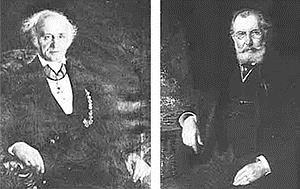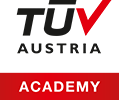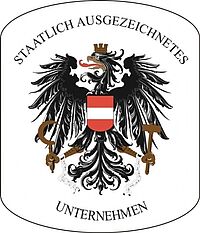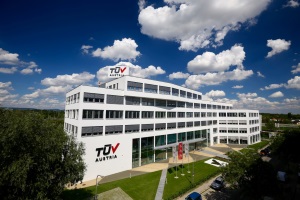 Adam Freiherr von Burg, Wilhelm Exner
Adam Freiherr von Burg, Wilhelm Exner
SUMMIT OF KNOWLEDGE: TÜV AUSTRIA ACADEMY
To teach and to learn: continuous education, the pursuit for greater understanding, the gift of ever broader comprehension are all as venerable as TUV itself. What was yet to be discovered and what is taken for granted today, how vessels bulging under stress of great pressure led to greater responsibilities and how all this is deeply connected with the founder of the Vienna Museum of Technology will be revealed in the following account of the TUV AUSTRIA Academy company history.
It is the latter half of the 19th century. The city of Vienna, capital of the Austro-Hungarian Empire, is bustling with around two million people. Due in large part to engineering genius James Watt, the industrial revolution emerges as an unstoppable phenomenon: steam boilers are no longer exclusive to mining operations, boats and locomotive engines but briskly pervade all areas of industry.
Questionable responsibility overshadows push for industrial efficiency
Efficiency proves the driving force behind increasing pressure levels. Steam boilers are inevitably rendered exponentially more dangerous: European statistics record an average of three deaths every two days due to steam boiler explosions. With additional scores of wounded and substantial collateral damage to buildings, the situation has deteriorated so horrifically, immediate action is necessary.
Wide gaps in technical safety must be mended and the irresponsible and embarrasing lack of expertise among inspection authorities has to be countered. So it is on June 11th, 1872 that representatives of the industry and trade branches congregate to found the "Dampfkessel-untersuchungs- und Versicherungsgesellschaft auf Gegenseitigkeit“ (eng. Mutual Steam Boiler Inspection and Insurance Society) – the precursor to the TUV AUSTRIA of today.
Saving lives and furthering the scientific cause
A machinery engineering graduate at the Imperial Polytechnical Institute, today's Technical University of Vienna, Wilhelm Exner quickly earns the reputation of a committed, exceedingly professional scientist, leaving no stone unturned in search of scientific insight for the good of man. As the third president of the society, Exner not only leads the society through the difficult times of the fall of the Austrian-Hungarian Empire.
It is indeed the charismatic genius engineer Exner who pushes for a steam and caloric testing laboratory to solve technical problems of third parties and conversely investigate new procedures and processes. Exner’s determination to advance technical knowledge and safety proves consummate. And so it is in 1909 that the government awards the testing laboratory its accreditation.
Prof. Exner furthermore writes a law that grants non-governmental enterprises the right to produce independently and objectively material testing certificates. This landmark law is so advanced and circumspect, it will remain effective for an astounding 84 years until 1994...
The TUV AUSTRIA Group
Testing, inspecting, monitoring, teaching: there were two key concerns when today’s TUV AUSTRIA was founded: collaborative study of technology and a constant exchange of experience. While a mere 1000 steam boilers had been registered for periodic inspection in 1872, the number rose to 3000 only three years later. Today, TUV AUSTRIA monitors 300.000 items of pressure equipment, in addition to 90.000 medical devices and 60.000 lifts.
To ensure that not even a single morsel of precious expertise crafted in the field is lost but studiously passed on, the TUV AUSTRIA Academy was founded in 1989.
Experience, collaboration and exchange: TUV AUSTRIA Academy
As the educational branch of TUV AUSTRIA Group’s sprawling operations, the goal and task of TUV AUSTRIA Academy are to teach the combined knowledge TUV experts accumulate in the five core areas: safety, technology, environment, quality and leadership. The Academy serves as a valuable platform where both trainers and students to learn from each others, benefitting immeasurably from their mutual practical experiences. As such, the TUV AUSTRIA Academy ensures that technological progress never overtakes TUV AUSTRIA’s vast educational efforts. For that much is certain: Technology is evolving ever more rapidly.
Technology is gaining in complexity. Laws are changing and safety awareness is increasingly acute. A comprehensive educational plan thus allows TUV AUSTRIA Academy graduates to keep up with technology, relying on the very expertise that forms the basis of their training.
The importance of superior training
Prof. Wilhelm Exner already knew that technically well-trained personnel was always in great demand. Exner therefore did not only found TUV AUSTRIA for this reason, but also the Technical Trade Museum (TGM, Technische Gewerbe Museum) which offered training courses at the site of one of Vienna’s most popular cultural institutes, the WUK (House of Manufacture and Culture) and the famous Technical Museum of Vienna in Vienna’s 14th district.
Although the Technical Trade Museum has long since moved to Vienna’s 20th district, a memorial plaque and the Wilhelm Exner Street on the east side of the building complex are proud reminders of the WUK’s glorious past as the epicenter of technical safety.
TUV AUSTRIA Academy may appear geographically removed from these historic sites by several kilometers. Yet Prof. Wilhelm Exner’s spirit still pervades every moment on the summit of knowledge, the renowned educational institute in Lower Austria, the TUV AUSTRIA Academy.




